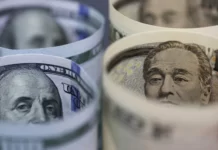Record-breaking heat in China. Wildfires forcing Swiss villages to evacuate. Drought ravaging Spanish crops. As the costs of climate change rack up, a debate is surging among governments: who should pay?
The question has been in the spotlight amid this week’s climate talks between the U.S. and China, where the world’s two biggest economies tried to find ways to work together on issues ranging from renewable energy deployment to climate finance ahead of this year’s U.N. climate summit, COP28, in Dubai.
During the talks in Beijing, U.S. climate envoy John Kerry said the two sides would continue to discuss climate finance over the next four months, before the COP28 conference starting Nov. 30.
“It’s difficult to argue that countries like China, Brazil or Saudi Arabia should still be put at the same level as the least developed countries and small island developing states,” a diplomat from one European Union country told Reuters.
Climate finance refers to money that wealthy countries pay toward helping poorer nations reduce CO2 emissions and adapt to a hotter, harsher world.
So far, the few dozen wealthy countries obliged to make these payments have not delivered cash in the amounts promised. That list of financing nations was decided during U.N. climate talks in 1992, when China’s economy was still smaller than Italy’s.
Other countries under similar pressure include Qatar, Singapore and the United Arab Emirates, three of the world’s richest nations in terms of GDP per capita.
So far, China has resisted calls that could group it alongside wealthy nations.
In a meeting with Kerry on Tuesday, Chinese Premier Li Qiang stressed that developed countries should deliver their unfulfilled climate finance commitments and take the lead in cutting emissions, according to Li’s office. He suggested developing countries could make contributions “within their capabilities.”
That resistance suggests the effort faces serious challenges. Changing the official U.N. donor list would require international consensus.
“There is much too much resistance among countries like China and Saudi Arabia to touch the official definition,” one EU official said on condition of anonymity.
Advocates for the change argue that an expansion needs to happen before a new – and, likely, far bigger – U.N. target for climate finance kicks in after 2025. Countries still need to negotiate the size of that target and who will contribute to it.
“All countries that are able, must contribute to global climate finance,” said Ambassador Pa’olelei Luteru, who chairs the Alliance of Small Island States.
The bigger issue, Luteru said, is which of the poor and most vulnerable countries will be in line to receive it.
WHO IS RESPONSIBLE?
The U.N. climate financing arrangement is based on the principle that rich countries have a greater responsibility to tackle climate change, because they have contributed the bulk of the CO2 emissions heating the planet since the industrial revolution.
The United States’ historical CO2 emissions are bigger than those of any other country, but China today is the world’s biggest CO2 emitter in terms of pollution produced each year.
Countries will face the question of historical responsibility at COP28, as they aim to launch a new fund to compensate vulnerable states for costs already being incurred in climate-fuelled natural disasters.
The EU dropped its years-long resistance to that fund last year, but on the condition that a larger group of countries pay into it. Countries have not yet decided who will contribute.
The United States has been cagey about making payments that could be seen as reparations for climate change.
Some countries not obliged to contribute to UN climate funds have done so anyway, including South Korea and Qatar. Others have begun channelling aid through other channels.
China launched the South-South Climate Cooperation fund in 2015 to help least developed countries’ tackle climate issues, and so far has delivered about 10% of the $3.1 billion pledged, according to think tank E3G.
That’s a fraction of the hundreds of billions that Beijing is spending on its Belt and Road Initiative, backing projects including oil pipelines and ports.
Such arrangements allow countries to contribute without obligation, although if done outside of U.N. funds they can face less stringent criteria for public reporting – making it harder to track where the money is going and how much is paid.
Byford Tsang, a senior policy advisor at E3G, said a Chinese offer of more climate finance would be a “win-win” for Beijing. “It would earn China diplomatic clout, and pressure Western donors to raise their stakes on climate finance,” he said.
Some vulnerable countries, frustrated with the flagging finance to date, are looking to new sources for cash. The Barbados-led Bridgetown Initiative is pushing for a revamp of multilateral development banks so they can offer more support for climate projects. Other nations have rallied behind a global CO2 levy on shipping to raise funds.
























Are you searching for the Best Bitcoin Recovery Expert To Recover Lost Cryptocurrency on the internet? Search no further (cyber genie (@)cyber services(.)com) got you 100% sorted. Just a few months ago I was wallowing in debts and pains because of a wrong investment idea. It was the lowest moment of my life, I just had to find a way to get back on my feet. I paid a few hackers on the internet to get the job of recovering my lost funds done, my guess is like yours, they failed woefully and took the little I have left also like the crypto investment scammer. I ran into luck finding Cyber Genie Hack Int’l on Yelp Reviews. Honestly, I was really in doubt, you can’t blame me. I was really desperate, I had no choice but to give it another try. I was able to recover my money with the help of this amazing Crypto Recovery Hacker guidance. I couldn’t believe my lost investment of $ 88,000.00 USD was recovered, at first it was like a dream, but it’s all reality. I just have to put this review out here, the world really needs to know about the Super-Hero of a hacker…!!!